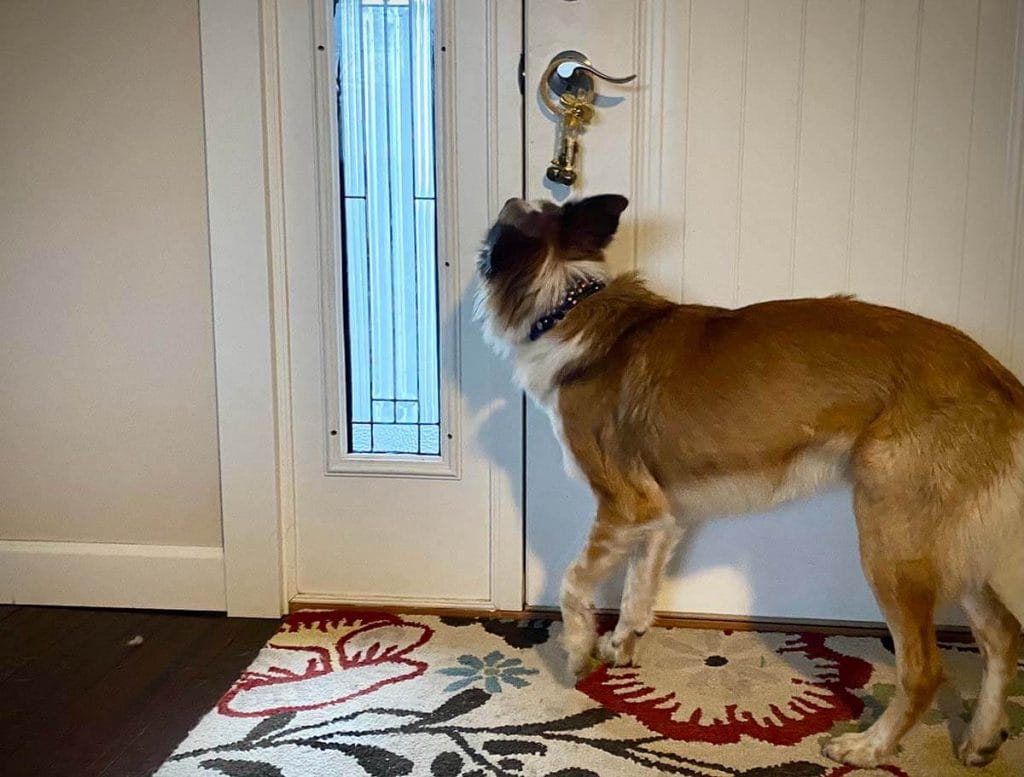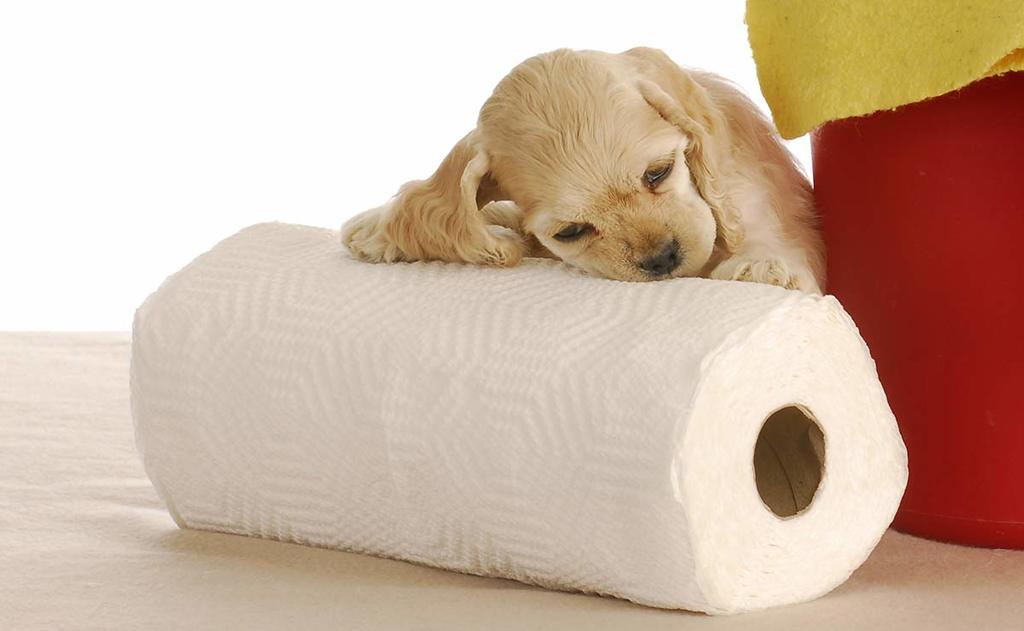Adopting a rescue dog is full of rewarding moments. When you found each other, you had dreams of living a life of fun playtimes, doggy kisses, and cuddles on the couch.
Until you realized that your dream dog is not potty trained. You adopted an adult dog hoping you could skip the puppy potty accidents.
Am I right?

This post may contain affiliate links, which means I’ll receive a commission if you purchase through my links, at no extra cost to you. Please read full disclosure for more information.
Have no fear, this phase of your rescue dog peeing or pooping in the house is short-lived if you take the proper steps below.
Is it normal for a rescue dog to pee in the house?
It is very normal for a newly-adopted dog to have potty accidents inside the house. Your dog is going through an extreme life-changing event. They are stressed, unsure, and confused.
As the 3-3-3 rule of rescue dogs explains, it can take 3 months or more for a new dog to become completely comfortable in its new home.
Some rescue dogs never lived inside a house before, so the concept of potty training is new to them. It’s up to you to train your new rescue, even if he is 1, 3, or 10 years old.
A dog is never too old to potty train, although I will warn you, the older the dog the more time and patients you will need.
Why does my rescue dog pee in the house?
Behavioral problems
Potty training issues can be triggered by stress, separation anxiety, a new environment, and even a new dog or people in the house.
Assess the entire situation before assuming your dog is peeing inside the house because of spite. I don’t believe dogs do things out of spite. There is almost always an underlying issue. Has changed in your dog’s environment lately, is there something they can be stressed about?
Medical problems
It’s important to rule out any medical issues that could be causing your rescue dog to have potty accidents inside the house.
Some common medical causes are:
- UTI (urinary tract infection)
- Giardia
- Spay Incontinence
- Kidney Disease
If you suspect any health problems, please contact your vet right away.
How to get a rescue dog to stop peeing in the house
Potty training an adult rescue dog is much like potty training a puppy. Start from the beginning as if he was a puppy.
The 6 main key points of potty training an adult rescue dog are:
- Restrict freedom inside the house. With the use of baby gates, play yards, and a leash you can limit your dog’s ability to have an accident by taking the opportunity away.
- Create a schedule. Feed your dog on a schedule so you can predict when they have to go potty. Dogs thrive on a daily schedule, especially a new rescue dog trying to adjust to his new home. A schedule makes life predictable and creates a feeling of safety. Being consistent is important at this stage of a rescue dog’s life.
- Go outside often. Take your rescue dog outside 30-60 minutes after they eat. If you have a fenced yard, let them out but do not allow playtime until after your dog potties. It’s best to use a leash to accomplish this at first.
- Pay attention to their water intake. While it is important to have fresh water for your dog at all times if you notice your dog drinking a lot of water, head outside shortly after.
- Create a safe potty area. Make sure to take your dog outside to a space they are comfortable enough to potty. Your rescue dog may be insecure, afraid of the outdoors, loud noises, etc.
- Reward your dog for pottying outside. Use healthy treats, playtime, and/or affection to let your dog know pottying outside is great.

How to teach your dog to let you know when he needs to go out
Every single one of my dogs has had their own signal of when they have to go potty. Our youngest pup, Thunder will circle the front door and hit the bell with his nose. Bear will pace around me and stare at me. And Ginger will sit at the front door.
Watch your dog’s body language and pick up on their subtle cues. It may take some time to learn, but when you notice it, you’ll have an aha moment.
Some people like to train their dogs to ring a bell at the door to alert them. This is easy to train by hanging the bell on the door and each time you take the dog outside to potty you ring the bell for them. Eventually, they pick up on the connection, bell equals outside potty time.
If you need more help, SpiritDog Training has a great course on Mastering Potty Training along with many other training programs you may be interested in.

Cleaning up potty accidents
You are here because your rescue dog is peeing in the house, which means you have pee stains on your floors. Dogs can smell dog urine even when we can’t.
It’s important to thoroughly clean any accidents with an enzyme cleaner specifically made for potty accidents.
The product I use and recommend is Nature’s Miracle. They have an entire line of carpet cleaner, hardwood floor cleaner, no more marking, and more. I also use Odoban for sanitizing and deodorizing the entire house.
Consider getting a black light urine detector to help you find old stains you can’t smell yourself, but I assure you your dog can.
After fostering many dogs and raising a puppy, there is a reason why we have all wood floors in our new house, LOL.
Read How can I remove dog urine odor from carpet?
FAQ about rescue dogs peeing in the house
How long does it take to house train a rescue dog?
Training a new rescue dog can take a few days or a month. It will depend on how old the dog is, if the dog was in a hoarding or puppy mill situation, and how consistent you are with the steps above.
My rescue dog is pooping in the house at night
Feed your dog on a schedule. Make sure they eat several hours before going to sleep and then take them outside 30-60 minutes after eating.
If your dog has trouble with bowel movements, consider adding a probiotic to his food. Exercise also helps, so take a long walk with your dog after he eats and has time for his food to settle.
How to house train a dog that has lived outside
If your rescue dog has lived outside for its entire life before coming to you, doesn’t mean he isn’t potty trained. Dogs do not like to eat, sleep or play in the same area as they potty.
So living outside your dog has most likely already established an area to potty and an area to live. By limiting access to the inside house and staying consistent with the steps above your new dog will be house training quickly.
If you live in an apartment or a home where it’s not easy to quickly take your dog outside, then you may want to try Doggy Lawn.
How to stop a dog from peeing in the house out of spite
As mentioned above, I don’t believe dogs pee in the house out of spite. Look at other environmental, medical or behavioral issues before jumping to the conclusion your dog is out to get you.
Why has my male dog suddenly started peeing in the house
Is your male dog peeing or marking inside the house? You’ll notice the difference between a puddle of urine vs. a small amount of sprayed urine on the wall, furniture, etc.
We struggled with marking for a long time with our male puppy. By limiting his freedom and being vigilant I think we have it under control, but I don’t want to jink it.
There could be medical reasons your male dog is suddenly peeing inside, review Why does my rescue dog pee in the house above.
Why is my dog peeing in the house all of the sudden
If your rescue dog was previously potty training and now having accidents, it could be a medical or behavior issue. Review Why does my rescue dog pee in the house above.
In conclusion
Your adopted dog peeing in house is not the end of the world. With a little time and a lot of patience your rescue dog will stop peeing in the house and you will have a potty trained dog.
First step is to check for any medical or environmental issues that could be causing the potty accidents. Then follow the 5 key steps above. Make sure to reward the good behavior and your dog will start asking to go outside to potty before you know it.
Trust me, I get how frustrating it is to have to clean urine or poop up after an adult dog. When fostering a dog we keep our mini carpet cleaner and Nature’s Miracle in arms reach at all times. Even with the best intentions, there will be accidents. But there is hope. Keep consistent and your dog will be potty trained soon.
If you have any tips or tricks to pottying training a rescue dog, please share below in the comments.




I rescued a Deaf 8 month old female doggy. I love her very much. I let her outside at 3:30 am, to pee. She jumped on foot to come in. 5 minutes later she peed on new frontroom carpet. For 3 days she did good. I have to have her on two walking leashes and stay by me. Has severe anxiety separation from me. She will scream scream, scream scream. It’s awful as long as she’s by me she’s OK is this potty training that’s getting to me I don’t allow her anywhere in my house without me. I am looking for dire help for this little girl I really want to keep her